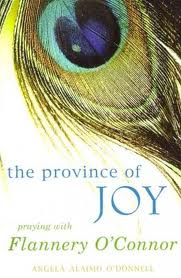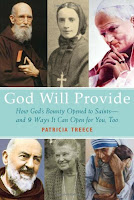The Province of Joy: Praying with Flannery O’Connor
Angela Alaimo O’Donnell
Many people consider Flannery O’Conner the best short-story writer of the twentieth century. Her macabre tales of death and dysfunction shake readers out of their comfort zone in order to show them grace in the darkest of circumstances. Her work continues to be praised by religious and secular critics alike.
However when studying her work, Flannery’s faith is often ignored. She was a devout Catholic who loved the Sacraments, studied the Summa, and prayed each day. Her faith clearly grounded her stories, inspiring themes like redemption, the surprise of grace, and the horror of sin.
While a small handful of books probe her spirituality, fewer if any explore her personal prayer life. This makes Angela Alaimo O’Donnell’s new book, The Province of Joy: Praying with Flannery O’Conner (Paraclete Press, paperback, 155 pages), a welcome contribution.
A poet and English professor at Fordham University, O’Donnel has written a book which is less biography and more “prayer book.” It’s structured like a “Book of Hours,” with morning and evening prayers for seven different days. Each day carries a theme, such as “The Christian Comedy”, “Blindness and Vision”, and “Facing the Dragon.” Each also has a Gospel meditation, prayers from the Divine Office, a passage excerpted from Flannery’s writings, and some closing reflections from O’Donnel herself.
The Divine Office structure is ripe for meditation and moreso when you add Flannery’s own writings. Here’s a sample passage:
“Faith is a “walking in darkness” and not a theological solution to mystery. The poet is traditionally a blind man, but the Christian poet, and storyteller as well, is like the blind man whom Christ touched, who looked then and saw men as if they were trees but walking. This is the beginning of vision, and it is an invitation to deeper and stranger visions.”
In Province of Joy, O’Donnel provides that same invitation. You’ll pray with Flannery, contemplate her words, and eventually emerge with “deeper and stranger visions”–visions that both comfort and provoke.
(If you want more of Flannery’s spiritual writing, check out her collected letters, Habit of Being, or the compilation of essays titled Mystery and Manners.)
God Will Provide: How God’s Bounty Opened to Saints and 9 Ways It Can Open for You, Too
Patricia Treece
When times are good, it’s easy to trust God. We all have peace when our bank account is full, our pantry lined with food, and our bodies in good health.
But what happens when desperation hits? What do you do when the car breaks down and you have no money to fix it? Or when you lose your job and don’t know where to turn?
That’s when our trust in God is ultimately measured. It’s then we wonder whether he’ll come through or not.
Those of us in that boat will find help in a new book by Patricia Treece titled, God Will Provide: How God’s Bounty Opened to Saints and 9 Ways It Can Open For You, Too (Paraclete Press, paperback, 206 pages).
Patricia provides many examples of God meeting needs, specifically those of the saints. She gives us Dorothy Day at the Catholic Worker house, wondering how to pay the rent before a man surprises her with just the right amount. We see Fr. Solanus Casey praying outside an empty food pantry, when a baker suddenly drives up with a truckload of food. Then there’s Mother Teresa, a paragon of divine trust, who throughout her life refused to fund-raise for her work, sure that God would provide money when needed (he did.)
Patricia draws nine principles from these inspiring stories to help deepen your own trust in God’s providence. Her tips include cultivating gratitude, retooling your mind, and giving yourself over to God’s care, even when you doubt it.
Like Jesus’ advice to “consider the lilies of the field”, the purpose of Patricia’s book is to move you from asking “why won’t God do more?” to recognizing how God has always taken care of you.
If you want to strengthen your trust in God, especially when such confidence seems unattainable, this is the book for you.
The Environment
Pope Benedict XVI
Pope Benedict XVI has long been considered a staunch conservative. Liturgically, morally, and doctrinally, most place him far to the right of any issue, which is precisely why people are surprised when he speaks on traditionally “liberal” issues like the environment.
A new book titled simply, The Environment (Our Sunday Visitor, paperback, 175 pages), collects excerpts from the Pope’s audiences, speeches, encyclicals, letters, and homilies, all dealing with care for creation.
 Pope Benedict doesn’t mince words in the collection. He dives right into hot topics like climate change, overpopulation, and the connection between peace and sustainability, and handles each with his characteristic balance and clarity.
Pope Benedict doesn’t mince words in the collection. He dives right into hot topics like climate change, overpopulation, and the connection between peace and sustainability, and handles each with his characteristic balance and clarity.
One of the Pope’s major emphases is the need for environmental solidarity. Whether we live in Arkansas or Africa, Mexico or India, we all live on the same collective planet. Pope Benedict affirmed this in his message for the 2007 World Day of Peace:
“Preservation of the environment, promotion of sustainable development and particular attention to climate change are matters of grave concern for the entire human family. With increasing clarity, scientific research demonstrates that the impact of human actions in any one place or region can have worldwide effects.”
The Environment isn’t meant to be political, nor was it designed as a science text. You won’t find data supporting or refuting global warming.
Instead, the Pope’s focus is on the moral and spiritual demands we all share in regard to the environment. Because of this angle, the book has the potential to be a bridge between social liberals and conservatives who are often far apart on this topic.
Pope Benedict XVI has spoken more on creation than perhaps any other pontiff or Catholic leader. This new collection synthesizes all his teachings and confirms that the environment isn’t just a “liberal” issue—it’s a deeply Catholic concern.



